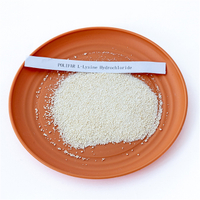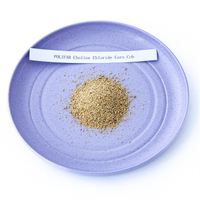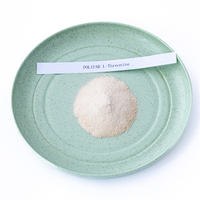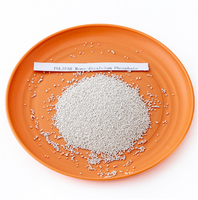| Availability: | |||||||||
|---|---|---|---|---|---|---|---|---|---|
| Color: White crystals or crystalline powder Material: corn Sales Models: wholesale Min Order: 1mt Shelf Life: two years when properly stored Packing: net 25kg/50kg/600kg in Plastic woven bags with PE lining Storage: stockpiled at the ventilated place, avoiding rain, moisture and insolation. Please handle with care to prevent bag damage, store away from toxic substances. | |||||||||
Assay/% ≥90
POLIFAR
292249
【Product name】: L-Leucine feed grade
【Chemical formula】: C6H13NO2
【CAS】: 61-90-5
【Product performance】:
L-leucine is not synthesized in animals, hence it must be ingested, usually as a component of proteins. It is synthesized in plants and microorganisms via several steps starting from.
As a dietary supplement, leucine has been found to slow the degradation of muscle tissue by increasing the synthesis of muscle proteins. Leucine is utilized in the liver, adipose tissue, and muscle tissue. In adipose and muscle tissue, leucine is used in the formation of, and the combined usage of leucine in these two tissues is seven times greater than its use in the liver.
【Storage】: Stockpiled at the ventilated place, avoiding rain, moisture and insolation. Please handle with care to prevent bag damage, store away from toxic substances.
【Packing】:Net 25kg/drum or 25kg/bag
【Loading】: 10.65MT/20FCL' ;9MT/20FCL' with pallets
【Shelf Life】: Two years when properly stored
【Product name】: L-Leucine feed grade
【Chemical formula】: C6H13NO2
【CAS】: 61-90-5
【Product performance】:
L-leucine is not synthesized in animals, hence it must be ingested, usually as a component of proteins. It is synthesized in plants and microorganisms via several steps starting from.
As a dietary supplement, leucine has been found to slow the degradation of muscle tissue by increasing the synthesis of muscle proteins. Leucine is utilized in the liver, adipose tissue, and muscle tissue. In adipose and muscle tissue, leucine is used in the formation of, and the combined usage of leucine in these two tissues is seven times greater than its use in the liver.
【Storage】: Stockpiled at the ventilated place, avoiding rain, moisture and insolation. Please handle with care to prevent bag damage, store away from toxic substances.
【Packing】:Net 25kg/drum or 25kg/bag
【Loading】: 10.65MT/20FCL' ;9MT/20FCL' with pallets
【Shelf Life】: Two years when properly stored
Testing Item | Standard | Result |
Appearance | White crystals or crystalline powder | conforms |
Assay/% | ≥90 | 99.6 |
Identification (Infrared Absorption) | Corresponding to Reference Spectrum | conforms |
Residue on Ignition/% | ≤1 | 0.1 |
Loss on Drying | ≤2 | 0.3 |
Testing Item | Standard | Result |
Appearance | White crystals or crystalline powder | conforms |
Assay/% | ≥90 | 99.6 |
Identification (Infrared Absorption) | Corresponding to Reference Spectrum | conforms |
Residue on Ignition/% | ≤1 | 0.1 |
Loss on Drying | ≤2 | 0.3 |
Q1: What are the benefits of L-Leucine?
A1: L-Leucine, an essential amino acid, provides numerous benefits for both humans and animals. It plays a crucial role in protein synthesis, which is vital for muscle growth and repair. By initiating protein synthesis in skeletal muscle, L-Leucine supports the development of lean muscle mass and helps in the recovery process after exercise or injury. Additionally, L-leucine is known to enhance endurance by preserving muscle glycogen levels and delaying fatigue during prolonged physical activity.
Q2: What does leucine do for animals?
A2: In animals, L-leucine serves similar essential functions. It promotes muscle growth and repair, thereby contributing to improved performance and overall health. By supporting efficient metabolism and nutrient absorption, L-leucine ensures optimal growth and development in animals. Furthermore, L-Leucine may play a role in immune function, helping animals to better cope with stressors and maintain resilience against diseases.
Q1: What are the benefits of L-Leucine?
A1: L-Leucine, an essential amino acid, provides numerous benefits for both humans and animals. It plays a crucial role in protein synthesis, which is vital for muscle growth and repair. By initiating protein synthesis in skeletal muscle, L-Leucine supports the development of lean muscle mass and helps in the recovery process after exercise or injury. Additionally, L-leucine is known to enhance endurance by preserving muscle glycogen levels and delaying fatigue during prolonged physical activity.
Q2: What does leucine do for animals?
A2: In animals, L-leucine serves similar essential functions. It promotes muscle growth and repair, thereby contributing to improved performance and overall health. By supporting efficient metabolism and nutrient absorption, L-leucine ensures optimal growth and development in animals. Furthermore, L-Leucine may play a role in immune function, helping animals to better cope with stressors and maintain resilience against diseases.








